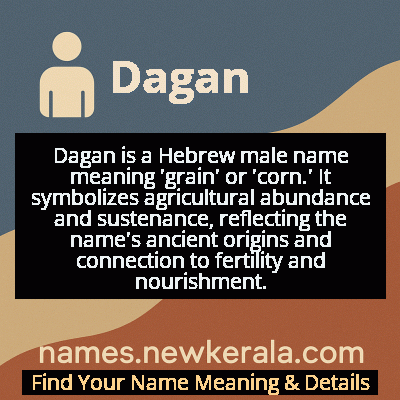Dagan Name Meaning & Details
Origin, Popularity, Numerology Analysis & Name Meaning of Dagan
Discover the origin, meaning, and cultural significance of the name DAGAN. Delve into its historical roots and explore the lasting impact it has had on communities and traditions.
Name
Dagan
Gender
Male
Origin
Hebrew
Lucky Number
9
Meaning of the Name - Dagan
Dagan is a Hebrew male name meaning 'grain' or 'corn.' It symbolizes agricultural abundance and sustenance, reflecting the name's ancient origins and connection to fertility and nourishment.
Dagan - Complete Numerology Analysis
Your Numerology Number
Based on Pythagorean Numerology System
Ruling Planet
Mars
Positive Nature
Generous, passionate, energetic, and humanitarian.
Negative Traits
Impulsive, impatient, moody, and can be overly emotional.
Lucky Colours
Red, maroon, scarlet.
Lucky Days
Tuesday.
Lucky Stones
Red coral, garnet.
Harmony Numbers
1, 2, 3, 6.
Best Suited Professions
Military, sports, philanthropy, leadership roles.
What People Like About You
Courage, energy, leadership, generosity.
Famous People Named Dagan
Dagan
Ancient Mesopotamian deity
Chief god of the Philistines and Mesopotamian grain/fertility deity
Dagan
Biblical figure
Philistine god mentioned in the Hebrew Bible with temples in Ashdod and Gaza
Dagan
Modern Israeli figure
Contemporary bearer maintaining ancient Hebrew naming traditions
Name Variations & International Equivalents
Click on blue names to explore their detailed meanings. Gray names with will be available soon.
Cultural & Historical Significance
In Hebrew tradition, while Dagan was primarily viewed as a foreign deity, the name's agricultural meaning resonated with Israel's agrarian society and connection to the land. The biblical references to Dagon in Judges, Samuel, and Chronicles reflect the cultural interactions between ancient Israelites and their Philistine neighbors, making the name a historical bridge between competing civilizations in the ancient Levant. This dual identity—as both a foreign god and a concept fundamental to survival—gives the name unique cultural depth and historical resonance.
Extended Personality Analysis
Individuals named Dagan are often perceived as grounded, practical, and nurturing—qualities that reflect the name's agricultural origins. They tend to possess a strong connection to tradition and family, with a steady, reliable nature that others find comforting. Like the grain that sustains communities, Dagans are often seen as providers who value stability and gradual growth over rapid change.
Their personality typically combines patience with determination, able to weather challenges while working steadily toward long-term goals. Many Dagans exhibit a quiet strength and resilience, much like crops that endure seasonal changes to eventually bear fruit. They often have a practical wisdom and hands-on approach to problem-solving, preferring tangible results over abstract theories. This combination of earthy practicality and enduring strength makes them valued members of their communities and reliable partners in both personal and professional relationships.
Modern Usage & Popularity
In contemporary times, Dagan remains a relatively rare but meaningful choice, primarily used within Jewish and Israeli communities where it maintains its Hebrew heritage. The name has seen modest but steady usage in Israel since the state's founding, often chosen by parents seeking a name that connects to ancient Semitic roots while avoiding overtly religious connotations. Outside Israel, Dagan appears occasionally among diaspora Jewish families and occasionally among non-Jewish parents drawn to its strong, earthy sound and agricultural symbolism. While not ranking among popular baby names globally, it maintains a niche appeal for those valuing historical depth and natural imagery in naming choices, particularly among parents interested in names with substantial cultural heritage and meaningful symbolism.
Symbolic & Spiritual Meanings
Symbolically, Dagan represents fertility, sustenance, and the cycle of life—embodying the fundamental human dependence on agriculture and natural abundance. The name carries connotations of nourishment, both physical and spiritual, suggesting someone who provides for others and helps things grow. Like grain that must be planted, tended, and harvested, Dagan symbolizes patience, process, and the reward of consistent effort. It also represents connection to the earth and natural rhythms, embodying stability and foundational strength. In a broader sense, the name evokes themes of community sustenance, as grain has historically been the cornerstone of civilization's development and survival, making Dagan a name that speaks to fundamental human needs and the enduring cycles of nature.

